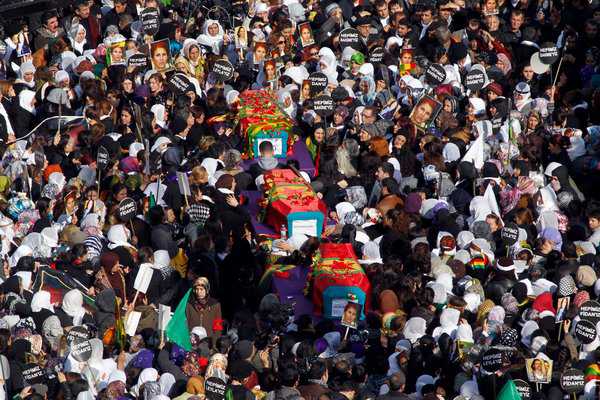
Three Kurdish activists who were killed in Paris last week were mourned Thursday in the southern Turkish city of Diyarbakir. Tens of thousands attended.
By SEBNEM ARSU
HATAY, Turkey — Tens of thousands of people gathered Thursday in the southern city of Diyarbakir to mourn the deaths of three Kurdish activists murdered in Paris last week, an outpouring that some said amounted to the largest political gathering that the Turkish authorities had ever allowed the Kurds to stage.
With fragile peace talks to end three decades of armed insurgency just beginning, top Turkish and Kurdish officials called for calm, and none of the national television networks carried the event live. But a few Web portals provided real-time coverage as crowds accompanying three funeral trucks for the women poured into Batikent Square in Diyarbakir, the hub of Kurdish political and cultural life. The most prominent of the slain women, Sakine Cansiz, was a founding member of the insurgent group, the Kurdistan Workers’ Party, or P.K.K. Experts said she had been raising funds for the group in Europe.
The private IMC TV portal showed that many in the crowd wore white scarves for peace and black clothing for mourning, as suggested by the pro-Kurdish Peace and Democracy Party, the organizer of the ceremony.
The reason for the killings remains unclear, but they were widely perceived as an effort to derail the talks, which for the first time involve Abdullah Ocalan, the founder and spiritual leader of the P.K.K., who has been held in an isolated island prison since his capture in 1999.
Ms. Cansiz, 55, was his close ally. The two women found dead with her — Fidan Dogan, who would have turned 31 on Thursday, and Leyla Soylemez, 24 — were Kurdish activists. All three were found dead at the unmarked Kurdistan Information Office in Paris last Thursday, apparently shot by one or more gunmen with silenced pistols. The office had been locked from the outside, and three shell casings were found on the floor. Two women were shot in the head, one in the stomach.
Turkish government officials speculated that the killings might have emerged from internal conflict in the P.K.K. The P.K.K. is known for meting out strict operational discipline, including punishments as extreme as executions for wayward members. Some Kurdish political activists countered by accusing the Turkish “deep state,” a nationalist underground network that was behind hundreds of extrajudicial assaults against Kurds in the 1990s and considers any ethnicity a threat against Turkey’s national unity.
The mourners on Thursday carried pictures of the slain women and round black banners that read, “We all are Sakine,” “We all are Fidan” and “We all are Leyla.”
Turkish security forces remained at a distance despite the crowds, which some took as a sign of the government’s sincerity in the quest for a peace deal.
“In the past, the police would have definitely interfered such a funeral crowd, and things would have turned violent,” one Kurd who attended the ceremony, Mustafa Iritas, said in a phone interview. “This is a very good sign for the talks. I am very happy, and have better hopes for peace.”
The talks between Mr. Ocalan and senior Turkish intelligence officials started in the last week of December. They focus on Ankara’s demands for the P.K.K. to lay down arms unilaterally and those who were involved in fighting to settle in a location other than Turkey. Mr. Ocalan’s participation drew strong criticism in nationalist circles that he was being given too much recognition, but it overwhelmingly pleased the nearly 15 million Kurds in Turkey and drastically elevated their sense of the chances for a resolution.
“Even today that we’ve lost three comrades to a massacre, our people call for peace and brotherhood of peoples,” Ahmet Turk, a prominent Kurdish politician, said as he addressed the crowd from the top of a bus parked in front of three coffins wrapped in P.K.K. flags. “However, peace would only come with mutual respect and communication of people, with justice and equality.”
More than 40,000 people have been killed in P.K.K. attacks or anti-P.K.K. military operations since the group, which has a separatist agenda, took up arms in 1984. It conducted suicide bombings and assaults at tourism centers, prompting Turkey, the European Union and the United States to label it a terrorist organization.
Many in the group, like Ms. Cansiz, fled to Europe as political refugees after the 1980 military coup in Turkey. But they continued to generate financial resources and political propaganda as the P.K.K. continued sporadic attacks in Turkey from bases in the Qandil Mountains in northern Iraq.
Peace talks in Oslo in 2011 broke down after recordings were leaked to the news media, igniting strong reactions in nationalist circles that oppose any contact with the rebels. A surge of violence followed.
Cumali Soylemez, the father of Ms. Soylemez, was one of the last speakers who took the stage before coffins were sent off to Tunceli, Kahramanmaras and Mersin for burials on Friday.
“I do not have much to say, except that they wanted peace and got killed by traitors, but we will continue with peace,” he said. “Peace is a good thing. Damn the war; war is just bad.”

Leave a Reply